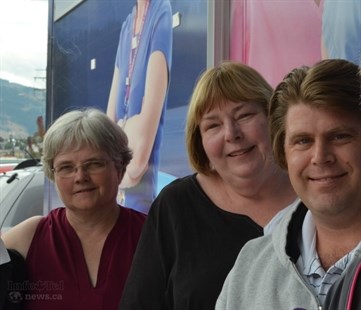
Debra McPherson (middle) says B.C. needs to do more to keep care home patients and staff safe.
(CHARLOTTE HELSTON / iNFOnews.ca)
August 29, 2013 - 9:22 AM
"THERE WERE CLIENTS WE'D NEVER VISIT ALONE"
VERNON - If you think being a bouncer is tough work, don't try nursing. Patients getting black eyes and knocked out teeth, nurses getting struck so hard they can't return to work because of the brain damage: these are some of the real life stories that transpire in B.C.'s long term care homes.
Following the recent death of one senior at the hand of another at the Polson Special Care Facility in Vernon, we are learning that assaults against patients—and staff—are all too common in care homes. John Furman, 95, allegedly assaulted William May, 85, around 11 p.m. Aug. 18. Furman had been at the care home less than two weeks, and rooming with May only three days when the incident occurred. In a media conference, May's sons told reporters that while this was the most extreme assault their dad had experienced, it wasn't the first. In his two years at the facility, he suffered a black eye and lost a couple teeth. The widow of a Kamloops senior who died in similar circumstances, says something has to change before another life is lost.
B.C. Nurses Union President Debra McPherson says assaults are on the rise at long term and mental health care homes in the province. She says the number of dementia patients is growing and staffing isn't being increased to meet the demand. In some cases, positions are even being cut. At the same time, McPherson says the government is trying to save money by hiring lesser trained and cheaper care aids to fill positions.
Staffing shortages, lack of properly trained staff and insufficient security services share a nasty side-effect: increased assaults.
"We've had clients do such bodily harm to staff that they've caused brain damage and the nurses have been unable to return to work," McPherson says. "This can't continue."
But is violence an inherent part of working in a long term care facility? McPherson says it's not.
"Some employers believe it's part of the job. Just suck it up and get used to it. Do they say to construction workers 'your risk of falling off a building is there so just deal with it?' No. We are always looking at mitigation and prevention to keep staff and patients safe."
That said, a psychiatric nurse who used to work at the Polson Special Care Unit says "you know what you're getting into" when signing on.
"Patients come to Polson Special for a reason. It's a place for those with a higher level of risk," says the nurse, who preferred to remain anonymous. "There were some clients you'd feed at an arm's length, or come at on their weak side. There were clients we'd never visit alone."
MANAGING MEDICATION
If you were careful, assaults could usually be prevented, she says. Learning a patient's needs and triggers, what their medications are and how they interact with people helped to diffuse potentially dangerous situations. But getting to know a patient takes time, and it's new clients that pose the greatest risk.
Figuring out what combination of medications will work for a patient is a first step for doctors and nurses when a new client walks in the door. But they never know how someone will react to them.
"We don't have a crystal ball, it's a bit of trial and error," she says.
That can mean getting the opposite effect of what was intended. Drugs like Atavan, used to calm anxiety, can have a paradoxical effect in dementia patients, actually making them more angry and agitated. An effect called "sundowning" is also common in dementia patients, in which their moods reverse when night falls.
Even after a patient's medications are figured out, there's no telling when they might have to be adjusted again.
"As the illness gets worse, you don't know what you're going to find," she says.
Flashbacks into old memories are also common. Sometimes, they're happy ones, others times, not so much.
"We don't try to bring them back. There's no point. We let them stay in their memories," she says. "How do we know John Furman wasn't in a (war) memory? Something as small as a smell, the type of blanket, the colour on the walls can trigger a memory. How could anyone possibly foresee something like that?"
While precautions can be taken, Polson Special's ex-nurse says not everything can be prevented.
"I'm sure staff did the best they could. These poor people with dementia deserve the best care possible. They have to go somewhere," she says.
And Polson's not a bad place to be, she says. Her memories of the facility are filled with family barbeques, activities, good meals, and well cared for patients.
"I would still send a family member there, absolutely. Even with what's happened."
To contact the reporter for this story, email Charlotte Helston at chelston@infotelnews.ca, call (250)309-5230 or tweet @charhelston.
News from © iNFOnews, 2013